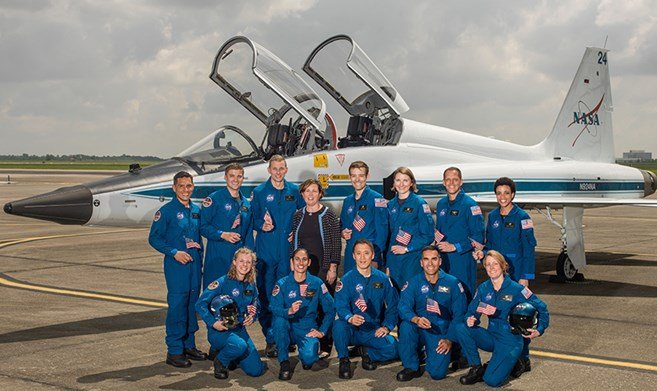The soft skill NASA wants in every astronaut
Anna Roemer (black shirt and jacket) with the NASA astronaut class of 2017. Anna leads the astronaut selection process, and in ‘17 she selected these 12 from over 18,000 applicants.
In 2021, 12,000 Americans applied to be a NASA astronaut.
Just 10 were accepted.
10.
The acceptance rate was < .01%, from an already impressive applicant pool. The best of the best of the best.
Becoming a NASA astronaut is 80x harder than getting into Harvard.
NASA doesn’t even look at applications unless a candidate meets some basic requirements.
US citizenship.
Master’s degree in something technical. Science, tech, engineering, or math.
Two years of relevant professional experience or 1,000 hours of pilot-in-command time in a jet aircraft.
Peak physical condition - you have to pass NASA’s long-duration flight astronaut physical.
Then they look at the rest of an applicant’s qualifications, including the soft stuff.
For example, conscientiousness.
You might think NASA would screen for candidates who score highly on conscientiousness, the character trait associated with being careful, thorough, and diligent.
Conscientious people tend to be efficient and organized (as opposed to laid back and easy-going). And in space, we need people who are efficient and organized.
Space shuttles cost $1.7B and the average launch is another $450M.
We can’t hire astronauts who might forget their keys on their nightstand.
But NASA psychologists figured out the highest performing astronauts aren’t as conscientious as you might think. In fact, too much conscientiousness is bad.
Turns out space is unpredictable. And subjects who score lower in conscientiousness make better decisions on tasks when the stuff hits the fan.
That’s why NASA screens for moderate conscientiousness.
The best astronauts exhibit grace under fire. They’re cool.
Also, astronauts don’t do solo flights. They work in teams in small spaces for weeks. Months. NASA’s data says having a highly conscientious person around can be annoying.
NASA research has shown people who score very highly on conscientiousness are more likely to be seen by others as a hindrance. To others, the conscientious person can feel like a nag.
A nag.
NASA’s word, not mine.
Even if you can solve the rocket equation Δv=uln(mim), NASA doesn’t want you if you’re annoying to have around.
Very smart. Very fit. Very educated. Yes, yes, and yes.
But to be a NASA astronaut, you also have to be cool.
Hat tip: I first learned about NASA hiring criteria from Ben Kettle, a Nashville guy who writes an excellent free weekly newsletter on hiring.

